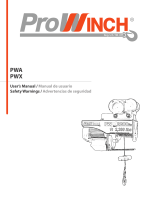4.0 Table of contents
Section Page
1.0 IMPORTANT SAFETY INSTRUCTIONS ....................................................................................................... 2
2.0 Important notice ............................................................................................................................................. 3
3.0 About this manual .......................................................................................................................................... 3
4.0 Table of contents ............................................................................................................................................ 4
5.0 Product introduction ....................................................................................................................................... 5
6.0 Glossary ......................................................................................................................................................... 5
7.0 TS series hoist specifications ......................................................................................................................... 6
7.1 230 Volt models .......................................................................................................................................... 6
7.2 460 Volt models .......................................................................................................................................... 7
7.3 TS series hoist dimensions with MT trolley ................................................................................................ 8
7.4 Operating environment ............................................................................................................................... 8
8.0 Unpacking ...................................................................................................................................................... 9
9.0 Installation ...................................................................................................................................................... 9
9.1 Mounting top hook ...................................................................................................................................... 9
9.2 Power cable ................................................................................................................................................ 9
9.3 Lubrication ................................................................................................................................................ 10
9.4 Chain container ........................................................................................................................................ 10
10.0 Electrical connections ................................................................................................................................ 10
10.1 GROUNDING INSTRUCTIONS ............................................................................................................. 10
10.2 Inspecting hoist motion ........................................................................................................................... 11
11.0 Pre-operation inspection .................................................................................................................................. 11
11.1 Inspecting load chain .............................................................................................................................. 11
11.2 Inspecting hooks .................................................................................................................................... 11
12.0 Operation ................................................................................................................................................... 12
12.1 Controls .................................................................................................................................................. 12
12.2 General procedure ................................................................................................................................. 12
12.3 Magnetic brake function ......................................................................................................................... 13
13.0 Adjustments ............................................................................................................................................... 13
13.1 Replacing load chain .............................................................................................................................. 13
14.0 Mechanical classification (grade) ............................................................................................................... 16
15.0 Inspection and maintenance ...................................................................................................................... 17
15.1 Gearbox oil ............................................................................................................................................. 17
16.0 Inspection schedules .................................................................................................................................. 18
17.0 Allowable limits ........................................................................................................................................... 19
17.1 Hook wear limits (top and bottom) .......................................................................................................... 19
17.2 Chain wear limits .................................................................................................................................... 20
18.0 Chain container selection for TS series hoist ............................................................................................. 21
19.0 Pendant controllers for TS hoists ............................................................................................................... 21
20.0 Troubleshooting TS series Hoist ................................................................................................................ 22
21.0 Replacement Parts ..................................................................................................................................... 23
21.1.1 TS050,TS100 Motor Assembly and Housing – Exploded View .......................................................... 24
21.1.2 TS050,TS100 Motor Assembly and Housing – Parts List ................................................................... 25
21.2.1 TS050, TS100 Hook Assembly – Exploded View ............................................................................... 27
21.2.2 TS050, TS100 Hook Assembly – Parts List ........................................................................................ 28
21.3.1 TS050, TS100 Load Chain – Exploded View ...................................................................................... 29
21.3.2 TS050, TS100 Load Chain – Parts List ............................................................................................... 30
21.4.1 TS050, TS100 Gear Box – Exploded View ......................................................................................... 31
21.4.2 TS050, TS100 Gear Box – Parts List .................................................................................................. 32
21.5.1 TS050, TS100 Electrical Assembly – Exploded View ......................................................................... 34
21.5.2 TS050, TS100 Electrical Assembly – Parts List .................................................................................. 35
21.6.1 TS200,TS300,TS500 Motor Assembly and Housing – Exploded View ............................................... 36
21.6.2 TS200,TS300,TS500 Motor Assembly and Housing – Parts List ........................................................ 37
21.7.1 TS200,TS300,TS500 Hook Assembly – Exploded View ..................................................................... 38
21.7.2 TS200,TS300,TS500 Hook Assembly – Parts List .............................................................................. 39
21.8.1 TS200,TS300,TS500 Gear Box – Exploded View ............................................................................... 40
21.8.2 TS200,TS300,TS500 Gear Box – Parts List ....................................................................................... 41
21.9.1 TS200,TS300,TS500 Electric Assembly – Exploded View ................................................................. 42
21.9.2 TS200,TS300,TS500 Electric Assembly – Parts List .......................................................................... 43
22.0 Electrical connections ................................................................................................................................ 44
























